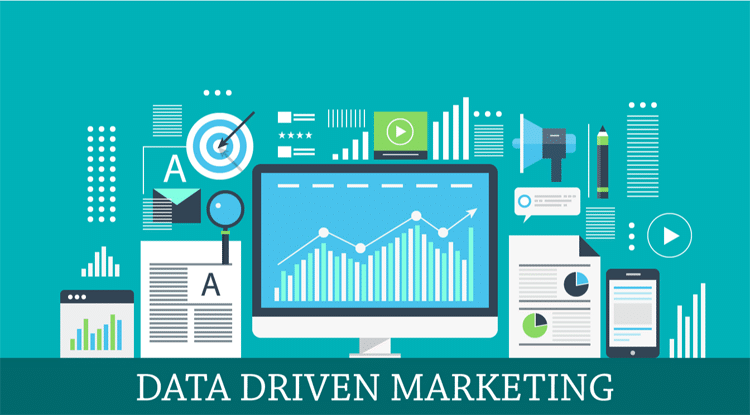 |
| What Is Data-Driven Marketing? – Definition and Tools |
Data-driven marketing: a brief definition
Data-driven marketing is the collection, analysis, and interpretation of data for marketing purposes. Federated information helps to better understand user behavior, facilitates marketing decision-making, and enables tailored advertising campaigns.
What is data-driven marketing? Detailed definition
Grace to social media and the widespread use of different devices, we live in a data-rich environment. In the age of big data, companies can collect the information that users leave online to better inform them and target their marketing campaigns.
More and more companies are now recognizing the importance of data-driven marketing. According to the Forbes Insights report on data- and customer-driven marketing, 64% of companies see data-driven marketing as a key lever.
According to a study published by IBM, companies that fully understand their customers generate a higher return than their competitors (+60%). So it's no surprise that 78% of marketers now decide to use data consistently. At the same time, the number of companies exploiting data-driven marketing insights has more than doubled since 2013.
Data-driven marketing relies on the use of information to implement personalized marketing actions according to the needs and wishes of customers. The objectives are to better understand consumer behavior and develop a marketing strategy based on the information obtained.
To do this, the data is collected for a specific purpose, at different stages of the customer journey (consultation of social media, online store, company website). They then make it possible to build and optimize marketing actions. The challenge of this approach is to combine the different flows of customer information collected both online and offline.
Data analytics can help marketers achieve several goals, such as:
- accurately measure and improve the results of online marketing campaigns
- personalize campaigns and improve their performance
- optimize communications on social networks
- develop content that is relevant to the user
- develop content marketing based on the planning of targeted editorial topics
- improve customer service
- increase customer satisfaction
- build customer loyalty
- predict certain events (predictive analytics)
- facilitate more accurate and timely decision-making
Data-driven marketing tools
Due to the variety of data that can be collected, data-driven marketing can become very complex. Therefore, some analysis and reporting tools are likely to support companies in collecting, structuring, and evaluating their data. It is essential to monitor the relevant KPIs of the campaigns conducted on each channel.
1. Web Analytics Tools
Google Analytics is the most popular web analysis tool. By integrating Google Analytics, it is possible to accurately analyze the behavior of users of a website. The analyses provided include the recording of certain key performance indicators, such as site traffic, number of page views, and journey time. Other possible alternatives to Google Analytics are E-Tracker, Piwik, and Chart Beat software.
2. Social Media Analytics Tools
Social media monitoring and social noise listening tools can not only measure relevant KPIs (such as interactions, mentions, and shares) but also analyze the tone of reviews and trends related to a brand. Tools such as Brandwatch, Sysomos, and Vico help optimize communications through social media.
3. Marketing Automation Tools
Marketing automation tools are software that combines web analytics obtained through the different communication channels used. This makes it possible to plan personalized marketing campaigns, then set them up and analyze them using tools such as Marketo, Hubspot, and Silverpop. These software or platforms collect data about users who visit online stores or consult the company's landing pages. Data can be used to develop targeted behavioral campaigns.
In addition, marketing automation tools can facilitate the management of users' own interests and be easily integrated into social networks, such as Facebook and Twitter.
4. Customer Relationship Management (CRM) Systems
The data generated by marketing automation tools is often linked to customer relationship management (CRM) software. This type of software helps to manage customer relationships by collecting and storing all related information (contact details, purchases made, etc.) in a centralized database.
Customer relationship management systems such as Salesforce and Sugar CRM make it easy to manage interactions with the company's customers. They help deploy targeted and effective customer support. They are usually used by the sales department and the marketing team, as well as by customer service.
Through all of these tools and technologies, data can be collected and used for online marketing and content marketing purposes. They are valuable in the management of digital campaigns. Data helps to better understand the customer journey and create content that is truly tailored to their needs. Data-driven marketing fosters interaction with potential customers, which can be tailored to every phase of their journey. In addition, it facilitates the optimization of key performance indicators at every stage.
Conclusion
Data is an essential decision-making tool for marketers, as it allows them to analyze and improve the performance of their campaigns.
In addition, the strategic use of data helps to improve revenue. Indeed, more than 57% of the companies surveyed said that data-driven marketing had led to a significant increase in the ROI of their campaigns.
However, developing a data-driven marketing strategy is also a major challenge. Businesses need the right tools and resources to properly manage, interpret, and integrate their data.
The use of data helps companies to be flexible and consistently optimize their online marketing and content marketing campaigns. Companies regularly use data to tailor their offerings and products to the needs of their potential customers.


Comments
Post a Comment